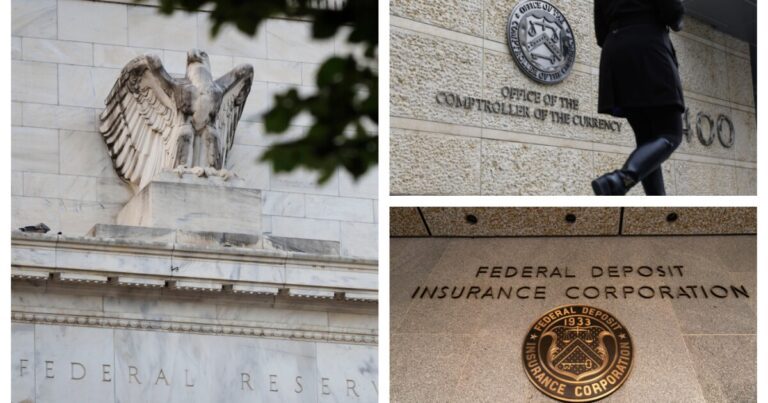
Bloomberg
WASHINGTON — Federal banking regulators on Thursday issued a joint warning — as well as a request for information about — the potential risks of bank-fintech partnerships.
The joint statement — issued by the Federal Deposit Insurance Corp., the Federal Reserve and the Office of the Comptroller of the Currency — warned banks about the risks associated with relying on third parties, particularly for deposit-related services.
“A bank’s use of third parties to perform certain activities does not diminish its responsibility to comply with all applicable laws and regulations,” the statement noted.
The joint statement notes that banks “sometimes rely on one or more third parties to maintain the system of recording deposits and transactions”, “process payments”, “perform regulatory compliance functions”, “provide service customer”, and much more.
Regulators have suggested that banks thoroughly vet the trustworthiness of third-party partners and establish clear contracts defining the roles and responsibilities of each party. They also suggested that banks conduct ongoing monitoring of management information systems used by third parties and have contingency plans on hand in the event of operational disruptions.
While the statement provides a roadmap for how banks could manage risks, it does not change existing regulations or supervisory expectations. The statement notes that relying on third parties to manage crucial operations – including deposits – can generally weaken banks’ oversight of these functions and hamper their ability to monitor risks.
Fragmented recordkeeping between third parties could confuse banks’ understanding of outstanding obligations and delay depositors’ access to funds. The agencies also highlighted concerns about the outsourcing of compliance functions and the risk of non-compliance with consumer protection obligations.
Additionally, the statement raises the possibility that unclear third-party relationships could mislead consumers about the extent to which their funds are covered by FDIC deposit insurance, which generally does not apply to non-banks. banking.
“Certain non-bank third parties could reasonably be mistaken for an insured depository institution by end users, particularly when they refer to FDIC deposit insurance in their marketing and other public-facing materials,” the statement said. .
“End users may not be aware that access to their funds may depend on a third party and that deposit insurance does not protect against losses resulting from third party failure.”
Regulators have worked to better understand bank-fintech partnerships, particularly
This situation
Just a few weeks ago, FDIC board members Jonathan McKernan and Rohit Chopra, who is also director of the Consumer Financial Protection Bureau, suggested that regulators consider issuing more specific guidance on related risks to third parties.
Thursday’s release provides some guidance to banks, but closely follows existing agency policies. Bank agencies also seek information from the public and interested parties about the risks associated with bank-fintech partnerships.
Fed Governor Michelle Bowman said Thursday that she supports information-gathering efforts, given the risks that third-party relationships can pose to consumers and the financial system.
“We have found that these relationships can present significant risks to banks and their customers, including retail deposit customers who reasonably expect that their deposits are insured and that their banking service provider complies with all applicable laws, including consumer protection laws,” she said. said in prepared remarks. “It is important that agencies fully understand the range of practices and different arrangements between banks and fintechs in the sector before issuing additional guidance.”
But Bowman, a former banker, also said she remains generally skeptical of any efforts to impose new regulations on banks under these partnerships.
“I remain concerned both about the risk of crowding out innovation from the regulated banking system and about the large number of new guidelines and rules for banks of all sizes,” she said. “I hope that this RFI and the ensuing process will not lead to duplicate or conflicting guidance, nor unnecessarily restrict innovation in the banking system.”

